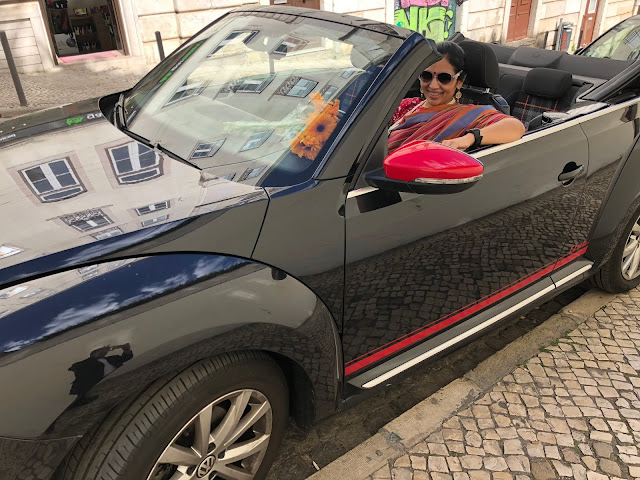I have already put a lot of travel information about Lisbon here. While Lisbon is super easy to commute by bus, metro and taxi, if you are a family and plan to see Sintra and other places, it is good to have your own rented car in Lisbon.
Affordable prices and an alluring combination of sunny skies, glorious architecture, deep-rooted traditions, and thoroughly modern flair have made Lisbon into a top destination for travellers. Record numbers of cruise ships are now docking at the revamped port, and Lisbon has gained a reputation as one of the best spots on the continent for live music—from rock to jazz and classical—with many events held in the city’s numerous leafy green spaces. Famously built on seven hills, Lisbon’s terra-cotta-roofed homes, turreted castles and cathedrals, and gleaming white basilicas appear to tumble down the cobbled slopes towards the glimmering River Tagus, as visitors traverse the city on antique, rattling streetcars, modern tuk-tuks, and Segways.
Lisbon has embraced change without casting aside its much-loved heritage. Colourful murals on every corner make it one of the best cities in Europe to see street art, while white sheets flap from the windows of the tightly packed hillside homes of Moorish Alfama. Boutique hotels sit beside hole-in-the-wall bars where locals sip ginjinha and strong espresso as they nibble on the world’s most irresistible custard tarts. The mournful sound of fado music still draws huge crowds of locals and visitors, even as hip bars and clubs move into formerly run-down areas of town. UNESCO World Heritage Sites sit proudly in the postcard-perfect suburb of Belém, the site from which Vasco da Gama and his fellow explorers set out during the much-celebrated Age of Discovery.
Counting some of Europe’s finest galleries, museums and cultural centres, and a vast aquarium among its indoor attractions, Lisbon has plenty to offer, even under rainy skies. An increasingly sophisticated dining scene is building on a growing appreciation for Portuguese food, with its abundant fresh fish, fruit and vegetables, and the astonishingly affordable wines that seem to accompany every meal. The relatively compact size of the city means it is possible to pack a lot into a short break, and visitors with the luxury of a longer stay can find fairy-tale mountain towns, rolling wine country, dolphin-filled bays, and long, white-sand beaches within less than an hour’s reach. Despite the rising costs that have accompanied the tourism boom, prices for most goods and services are still lower than most other European countries. You can still find affordable places to eat and stay, and with distances between major sights fairly small, taxis are astonishingly cheap. All this means that Lisbon is not only a treasure chest of historical monuments but also a place where you won’t use up all your own hard-earned treasure.
Affordable prices and an alluring combination of sunny skies, glorious architecture, deep-rooted traditions, and thoroughly modern flair have made Lisbon into a top destination for travellers. Record numbers of cruise ships are now docking at the revamped port, and Lisbon has gained a reputation as one of the best spots on the continent for live music—from rock to jazz and classical—with many events held in the city’s numerous leafy green spaces. Famously built on seven hills, Lisbon’s terra-cotta-roofed homes, turreted castles and cathedrals, and gleaming white basilicas appear to tumble down the cobbled slopes towards the glimmering River Tagus, as visitors traverse the city on antique, rattling streetcars, modern tuk-tuks, and Segways.
Lisbon has embraced change without casting aside its much-loved heritage. Colourful murals on every corner make it one of the best cities in Europe to see street art, while white sheets flap from the windows of the tightly packed hillside homes of Moorish Alfama. Boutique hotels sit beside hole-in-the-wall bars where locals sip ginjinha and strong espresso as they nibble on the world’s most irresistible custard tarts. The mournful sound of fado music still draws huge crowds of locals and visitors, even as hip bars and clubs move into formerly run-down areas of town. UNESCO World Heritage Sites sit proudly in the postcard-perfect suburb of Belém, the site from which Vasco da Gama and his fellow explorers set out during the much-celebrated Age of Discovery.
Counting some of Europe’s finest galleries, museums and cultural centres, and a vast aquarium among its indoor attractions, Lisbon has plenty to offer, even under rainy skies. An increasingly sophisticated dining scene is building on a growing appreciation for Portuguese food, with its abundant fresh fish, fruit and vegetables, and the astonishingly affordable wines that seem to accompany every meal. The relatively compact size of the city means it is possible to pack a lot into a short break, and visitors with the luxury of a longer stay can find fairy-tale mountain towns, rolling wine country, dolphin-filled bays, and long, white-sand beaches within less than an hour’s reach. Despite the rising costs that have accompanied the tourism boom, prices for most goods and services are still lower than most other European countries. You can still find affordable places to eat and stay, and with distances between major sights fairly small, taxis are astonishingly cheap. All this means that Lisbon is not only a treasure chest of historical monuments but also a place where you won’t use up all your own hard-earned treasure.




































































No comments:
Post a Comment